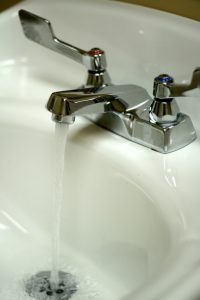 One of the jobs that we offer to homes in Clovis, NM is water treatment system installation (as well as repairs and maintenance as needed). Our team first performs water testing in a house, then offers a homeowner a rundown of the various impurities in the water coming from the municipal system or ground well. These impurities can include hard water minerals, pesticides, sulfur, heavy metals, and high acidity. Our water treatment experts can then offer solutions that will target these pollutants and clean the water.
One of the jobs that we offer to homes in Clovis, NM is water treatment system installation (as well as repairs and maintenance as needed). Our team first performs water testing in a house, then offers a homeowner a rundown of the various impurities in the water coming from the municipal system or ground well. These impurities can include hard water minerals, pesticides, sulfur, heavy metals, and high acidity. Our water treatment experts can then offer solutions that will target these pollutants and clean the water.
The most common type of water treatment system is the water filter. In many cases, a basic water filter is all that’s necessary to prevent harmful pollutants from entering a home’s plumbing and reaching the fixtures. (Point-of-use filters, such as filters attached to individual faucets, are not as effective and they don’t protect the rest of the plumbing system.) There are a number of different types of filters, and in this post, we are going to take a look at how the adsorption filter, which is the one most frequently installed him homes, does its job.
How Adsorption Filters Work
No, we didn’t misspell absorption. The process called adsorption is a method that water filters use to trap impurities.
The standard adsorption filter contains something known as activated carbon granules, which is usually just shortened to active carbon or AC. Activated carbon is based on charcoal, which is highly porous. Think of activated carbon as something like a sponge, except it’s made out of the graphite found in pencils. This is a sponge with numerous nooks in it and spread over a large surface area. This gives the activated carbon many opportunities to catch impurities in the water as the water moves across its surface. You’ll find a similar action in the small filters use for filtration pitchers, where the water passes down through several layers of activated carbon, losing pollutants along the way. A whole-house adsorption filter, however, is much more effective at cleansing the water than a pitcher filter.
Adsorption filters will not catch all impurities, however. There are a number of water quality issues that this type of filter won’t help much with. Hard water minerals like magnesium and calcium, as well as many heavy metals, will often slip through adsorption filters. Microbial and bacterial contaminants are too small for these filters as well. If your water has these contaminants, our specialists can pair an adsorption filter with a second filtration system, like a reverse osmosis filter or a water softener, to handle the particles that can slip past the first whole-house filter.
Adsorption filters require regular maintenance to keep them working at cleaning water. The many nooks and crannies in the activated carbon surface will eventually fill up with contaminants. The activated carbon will need to be replaced. Your water treatment specialists can give you an idea of how often this needs to be done so you can schedule routine maintenance.


.jpg)
[1].jpg)